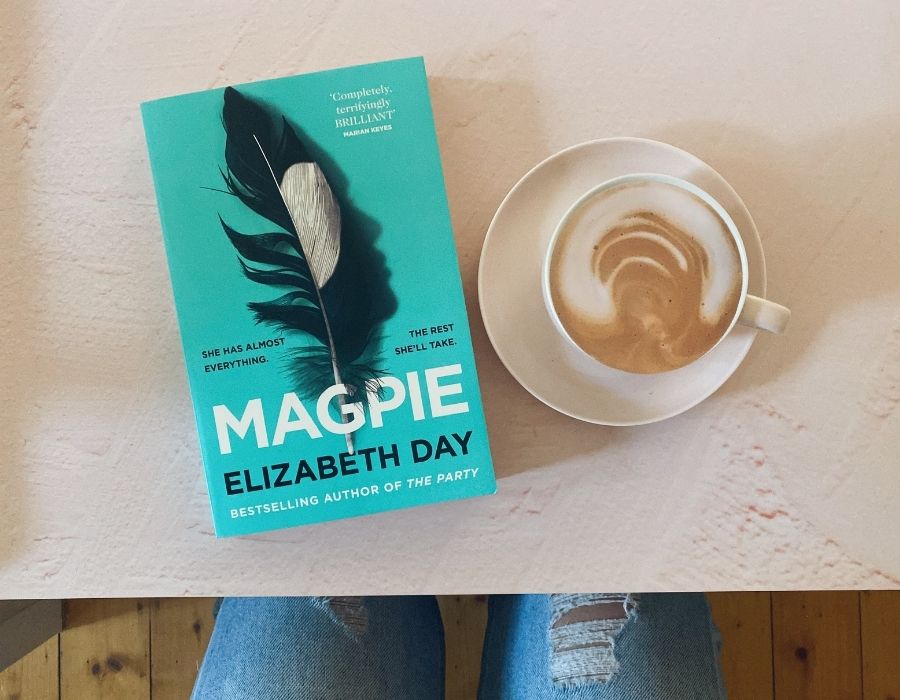Book Review on Elizabeth Day's Magpie

Elizabeth Day’s Magpie begins with Marisa, the narrator for much of the story, explaining her relationship with Jake and their desire to begin a family. We see her being shown round the house they will go on to live in, despite the omen of a single magpie swooping into the living room, as the estate agent shows her round.
We learn of the early relationship between Marisa and Jake and their need to take in a lodger to increase their income. Following the entrance of film publicist, Kate, into the equation, things start to unravel for Marisa. She resents Kate’s presence and thinks that Jake spends far too much time cosied up to Kate instead of her. The tension begins to become palpable.
And on it goes … the first half of Magpie pretty much sets the scene. We are introduced to all the main characters, including the manipulative mother-in-law figure.
The reader is then presented the same events again from a different viewpoint, that of Kate. It becomes clear that things no longer add up. A crisis point is reached, but this isn’t the end of the thriller. Jake’s parents become increasingly involved in the story as secrets and deceptions lead to a make or break scenario for Jake, Marisa and Kate.
As the reader progresses through the novel, they realise the power an unreliable narrator has over them. Elizabeth Day shows skill and mastery of the form and uses foreshadowing to incredible effect. Marisa is so credible, particularly because there is enough truth in what she says to leave the reader completely floundered as to what to think!
Magpie has been likened to Gillian Flynn’s Gone Girl, but other than the obvious thriller link, I found them very different reads. Magpie was a quick, straightforward page-turner, and I found it less frightening than Gone Girl. When I read Gone Girl, I felt that it was more accessible than Paula Hawkin’s The Girl on the Train. I’d say that Magpie is easier and has less depth than either, but regardless is extremely readable. It received quite high acclaim from my book club pals.
Book Club Questions on Elizabeth Day's Magpie
At what point in Magpie did you realize that Marisa was not who she seemed? Did you spot, ahead of time, either of the plot twists coming?
How would you classify the genre of Magpie?
Why do you think Elizabeth Day called the book Magpie?
How believable did you find Elizabeth Day’s Magpie? Discuss what was and wasn’t believable in the story.
The book starts by telling the reader how Marisa’s mother left her as a young child. What do you think is the significance of sharing this, in light of what happens later in the story?
Marisa stabbed her sister with a pin from her mother’s sewing box and then denied hurting her. Discuss why the writer chose to include this event in the story.
What is your opinion of Jake? To what extent is he to blame for how events unfold? How could he have prevented things escalating?
How would you sum up Annabelle’s character? Discuss.
How much sympathy do you have for Marisa?
It turns out that Marisa is bi-polar, but she has stopped taking her medication, as she didn’t want to hurt the baby. Does the book do a disservice to people who are bi-polar? Why or why not?
Discuss the significance of Jake’s secret visits to Annabelle and Marisa at his mother’s house? What does it suggest about both Jake and his mother?
What is your view of Jake’s father? Do you see him as a weak figure? Why or why not?
The book ends happily with Jake and Kate having the baby they wanted, but do you really think they will live happily ever after?
On the blurb of Elizabeth Day’s Magpie, Sara Collins, says “An absorbing exploration of infertility and mental illness combined with the pace and plot of a heart-racing thriller … I literally couldn’t put this down.” Did you find the book un-put-down-able?
When Marisa’s father visits her for the last time he seemed frail and old and she realized he would soon die. “She felt loss, not because his death would bring an absence, but because his existence had.” After that visit she ignored his messages and cards and didn’t contact him again. Discuss what this reveals about Marisa and the father /daughter relationship they had.

Book Discussion Questions on Elizabeth Day's Magpie (If you haven't read the book!)
When Kate catches Marisa following her on the tube, Marisa begs her to not tell Jake, but any sense of Marisa being contrite soon turns to anger against Kate. The narrator says, “Anger always wins.” Do you think anger is an emotion that is likely to supersede other feelings?”
When Kate visits Annabelle, she is passive aggressive and controlling. Jake can’t see that Annabelle is playing power games and being unkind. Would anyone like to share any mother-in-law stories?!
To what extent did the book add to your knowledge on surrogacy? If the group feels it appropriate to do so, discuss your personal feelings about whether surrogacy is something you might consider if you wanted children, but were unable to have them.
Personal Response to Elizabeth Day's Magpie
A story of two halves, jumping back in time, with NOW and THEN capitalised as chapter headings, indicating the time frame in which the events are set, Elizabeth Day’s Magpie is the most unusual psychological thriller I’ve read. For the whole first half I felt like I was reading realistic fiction focusing on family relationships, using surrogacy as a tool to explore the complexities of life. It didn’t feel like a thriller and I, somewhat predictably, didn’t see either of the twists coming! As a book club read this wasn’t the easiest book we’ve dissected. It felt like the author gave us the answers to the questions we were asking. There wasn’t much disagreement about characters, theme or plot. It was a good read and a great introduction to thrillers, for readers like me, who for far too long, have avoided them.